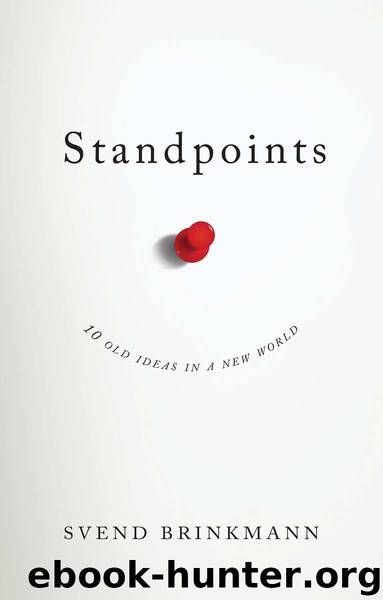Standpoints by Svend Brinkmann

Author:Svend Brinkmann
Language: eng
Format: epub, azw3, mobi
ISBN: 9781509523764
Publisher: Wiley
Published: 2018-02-15T00:00:00+00:00
The truth in an uncertain world
Arendt’s thinking reflects the major political upheavals of the twentieth century. It is a world in which, and for which, as Arendt puts it, we must ‘think without a banister’ – i.e. the conditions for life and for thought are constantly undergoing change. How do we derive an existential standpoint from this? The following quote from The Human Condition puts it beautifully: ‘even if there is no truth, man can be truthful, and even if there is no reliable certainty, man can be reliable’.2
The context for the quote is Arendt’s discussion of Descartes (1598–1650) and the transition from the Middle Ages to a more enlightened era based on scientific methodology and reason. Arendt did not think that truth and reliability are present in the world as such, but that it is up to humans to bring these phenomena into the world through our truthfulness and reliability. Why? Why is it good to tell the truth and act reliably? If we ask about the utilitarian value of these existential phenomena, we run the risk of distorting them. Considered purely as actions, they are an end in themselves, and therefore have a kind of intrinsic value. Centuries earlier, the Stoic, philosopher and emperor Marcus Aurelius (121–180 BCE) had expressed the same thought: ‘Although everything happens at random, don’t you, too, act at random.’3
The realisation that we live in an unstable and changing world is important – and the sense that the world is transient has presumably only intensified since Descartes. We know now about the Big Bang, palaeontology, geology and Darwinian evolution, according to which even mountain ranges and animal species are constantly changing. Again, the mind is drawn to Woody Allen’s depressing analysis of the lack of meaning. In philosophical terms, the recognition of the world’s fundamentally random and ever-changing nature is called contingency. The world is contingent in the sense that things have been and will be different. Does this mean that it is naive to insist on an existential standpoint for meaning? No. Arendt and the other thinkers cited in this book would reply that it is more a matter of how we respond to contingency. In recent years, it has been popular to respond by saying that when we live in an unpredictable world, we must be flexible and adaptable. But this effectively means perpetuating a state of affairs rather than registering it and seeking to respond intelligently to it. A wiser response would instead be to say that because stability is not a given in the world, it is up to us to create it. We can stabilise a contingent and fluid world by striving to speak truthfully and act reliably. We will never be able to establish an eternal and immutably fixed structure for the world, but we can realise some of the important ethical values in human relationships – and that is probably all that we can hope for. This presupposes that we think about life ‘from the inside’ and do not objectify it by distancing ourselves from the very life we wish to understand.
Download
Standpoints by Svend Brinkmann.azw3
Standpoints by Svend Brinkmann.mobi
This site does not store any files on its server. We only index and link to content provided by other sites. Please contact the content providers to delete copyright contents if any and email us, we'll remove relevant links or contents immediately.
| Anthropology | Archaeology |
| Philosophy | Politics & Government |
| Social Sciences | Sociology |
| Women's Studies |
Nudge - Improving Decisions about Health, Wealth, and Happiness by Thaler Sunstein(7711)
The Fire Next Time by James Baldwin(5451)
iGen by Jean M. Twenge(5418)
Adulting by Kelly Williams Brown(4579)
The Sports Rules Book by Human Kinetics(4392)
The Hacking of the American Mind by Robert H. Lustig(4386)
The Ethical Slut by Janet W. Hardy(4260)
Captivate by Vanessa Van Edwards(3842)
Mummy Knew by Lisa James(3694)
In a Sunburned Country by Bill Bryson(3544)
The Worm at the Core by Sheldon Solomon(3488)
Ants Among Elephants by Sujatha Gidla(3468)
The 48 laws of power by Robert Greene & Joost Elffers(3293)
Suicide: A Study in Sociology by Emile Durkheim(3024)
The Slow Fix: Solve Problems, Work Smarter, and Live Better In a World Addicted to Speed by Carl Honore(3012)
The Tipping Point by Malcolm Gladwell(2927)
Humans of New York by Brandon Stanton(2873)
Get What's Yours for Medicare: Maximize Your Coverage, Minimize Your Costs by Philip Moeller(2751)
Handbook of Forensic Sociology and Psychology by Stephen J. Morewitz & Mark L. Goldstein(2705)
